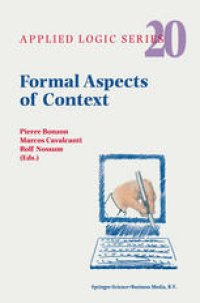
Ebook: Formal Aspects of Context
- Genre: Mathematics // Logic
- Tags: Logic, Artificial Intelligence (incl. Robotics), Mathematical Logic and Foundations
- Series: Applied Logic Series 20
- Year: 2000
- Publisher: Springer Netherlands
- Edition: 1
- Language: English
- pdf
We welcome Volume 20, Formal Aspects of Context. Context has always been recognised as strongly relevant to models in language, philosophy, logic and artifi cial intelligence. In recent years theoretical advances in these areas and especially in logic have accelerated the study of context in the international community. An annual conference is held and many researchers have come to realise that many of the old puzzles should be reconsidered with proper attention to context. The volume editors and contributors are from among the most active front-line researchers in the area and the contents shows how wide and vigorous this area is. There are strong scientific connections with earlier volumes in the series. I am confident that the appearance of this book in our series will help secure the study of context as an important area of applied logic. D.M.Gabbay INTRODUCTION This book is a result of the First International and Interdisciplinary Con ference on Modelling and Using Context, which was organised in Rio de Janeiro in January 1997, and contains a selection of the papers presented there, refereed and revised through a process of anonymous peer review. The treatment of contexts as bona-fide objects of logical formalisation has gained wide acceptance in recent years, following the seminal impetus by McCarthy in his 'lUring award address.
The First International and Interdisciplinary Conference on Modelling and Using Context, Rio de Janeiro, January 1997, gave rise to the present book, which contains a selection of the papers presented there, thoroughly refereed and revised.
The treatment of contexts as bona fide objects of logical formalisation has gained wide acceptance, following the seminal impetus given by McCarthy in his Turing Award address.
The field of natural language offers a particularly rich variety of examples and challenges to researchers concerned with the formal modelling of context, and several chapters in the volume deal with contextualisation in the setting of natural language. Others adopt a purely formal-logical viewpoint, seeking to develop general models of even wider applicability.
The 12 chapters are organised in three groups: formalisation of contextual information in natural language understanding and generation, the application of context in mechanised reasoning domains, and novel non-classical logics for contextual application.
The First International and Interdisciplinary Conference on Modelling and Using Context, Rio de Janeiro, January 1997, gave rise to the present book, which contains a selection of the papers presented there, thoroughly refereed and revised.
The treatment of contexts as bona fide objects of logical formalisation has gained wide acceptance, following the seminal impetus given by McCarthy in his Turing Award address.
The field of natural language offers a particularly rich variety of examples and challenges to researchers concerned with the formal modelling of context, and several chapters in the volume deal with contextualisation in the setting of natural language. Others adopt a purely formal-logical viewpoint, seeking to develop general models of even wider applicability.
The 12 chapters are organised in three groups: formalisation of contextual information in natural language understanding and generation, the application of context in mechanised reasoning domains, and novel non-classical logics for contextual application.
Content:
Front Matter....Pages i-x
Formal and Computational Models of Context for Natural Language Generation....Pages 1-21
Requirements for Dialogue Context Modelling....Pages 23-36
Contextual Constraints on Thematization in Written Discourse: An Empirical Study....Pages 37-47
Context and Implicitness: Consequences for Traditional and Computer-Assisted Text Analysis....Pages 49-63
A Context-Based Mechanization of Multi-Agent Reasoning....Pages 65-83
Presuppositions in Context: Constructing Bridges....Pages 85-106
Reasoning with Multilevel Contexts in Semantic Metanetworks....Pages 107-126
Contextual Learning: Towards Using Contexts to Achieve Generality....Pages 127-141
Contextual Deontic Logic: Violation Contexts and Factual Defeasibility....Pages 143-160
A Local Models Semantics for Propositional Attitudes....Pages 161-174
Context-Based Semantics for Information Integration....Pages 175-192
Structured Contexts with Fibred Semantics....Pages 193-209
Back Matter....Pages 211-216
The First International and Interdisciplinary Conference on Modelling and Using Context, Rio de Janeiro, January 1997, gave rise to the present book, which contains a selection of the papers presented there, thoroughly refereed and revised.
The treatment of contexts as bona fide objects of logical formalisation has gained wide acceptance, following the seminal impetus given by McCarthy in his Turing Award address.
The field of natural language offers a particularly rich variety of examples and challenges to researchers concerned with the formal modelling of context, and several chapters in the volume deal with contextualisation in the setting of natural language. Others adopt a purely formal-logical viewpoint, seeking to develop general models of even wider applicability.
The 12 chapters are organised in three groups: formalisation of contextual information in natural language understanding and generation, the application of context in mechanised reasoning domains, and novel non-classical logics for contextual application.
Content:
Front Matter....Pages i-x
Formal and Computational Models of Context for Natural Language Generation....Pages 1-21
Requirements for Dialogue Context Modelling....Pages 23-36
Contextual Constraints on Thematization in Written Discourse: An Empirical Study....Pages 37-47
Context and Implicitness: Consequences for Traditional and Computer-Assisted Text Analysis....Pages 49-63
A Context-Based Mechanization of Multi-Agent Reasoning....Pages 65-83
Presuppositions in Context: Constructing Bridges....Pages 85-106
Reasoning with Multilevel Contexts in Semantic Metanetworks....Pages 107-126
Contextual Learning: Towards Using Contexts to Achieve Generality....Pages 127-141
Contextual Deontic Logic: Violation Contexts and Factual Defeasibility....Pages 143-160
A Local Models Semantics for Propositional Attitudes....Pages 161-174
Context-Based Semantics for Information Integration....Pages 175-192
Structured Contexts with Fibred Semantics....Pages 193-209
Back Matter....Pages 211-216
....